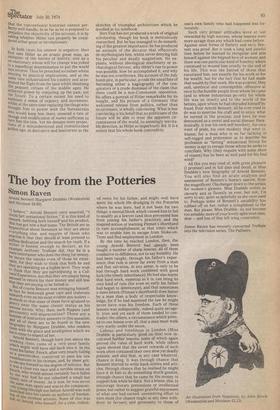The boy from the Potteries
Simon Raven
Arnold Bennett Margaret Drabble (Weidenfeld and Nicolson E4.95)
"I believe," Arnold Bennett once asserted, "I could fart sensational fiction." It is this kind of remark, belitting both himself and his product, that has got him a bad name. The British are as hypocritical about literature as they are about everything else, and require of those who Practise it that they should at least pretend to selfless dedication and the search for truth. If a writer is' honest enough to declare, as for example Anthony Trollope did, that he is a mere entertainer who does the thing for money, he incurs the rebuke even of those he entertains, for they wish to think that both he and they are operating on a higher level. They wish to think that they are participating in a Cultural Experience, not that they are simply being a, mused in return for their money and still less that they are paying to be farted at. But of course Bennett was wronging himself. '11 fact he bestowed great care and elaborate research even on his most evident pot-boilers — so much so that some of these have attained to Pretty near the same classic status as his serious novels. Why, then, such flippant (and persistent) self-depreciation? There are a number of instructive answers to this question, 3.1.1(1 all of them are to be found in the new biography by Margaret Drabble, who renders I,HI ' with the grace and intelligence which we aave come to expect of her. Arnold Bennett, though born just above the ww?rkiInch ng class, came of a very poor family e might well have slid back into it. In the avsent his father, Enoch, after very nearly failing ex a Paaminatwnbroker, contrived to pass his law , ions in nis thirties, and, by sheer grit, 0 elevate himself to the degree of solicitor. But i,..Was a close run race and a terrible strain on 1.,"°ch, who would almost certainly have fallen anthe way had he not inherited a small but theeLsum of money. As it was, he was never vetv-„"'"e man again and was to die comparatilauung (though not before Arnold was well ing oiled into his career as author) of hardenlost the cerebral arteries. None of this was on Arnold, who himself, for a time, collect
ed rents for his father, and might well have spent his whole life drudging in the Potteries where he was born, had it not been for two things: a mental block which caused him to fail to qualify as a lawyer (and thus prevented him from joining his father's practice); and the inspired notion at learning Pitman's shorthand (a rare accomplishment at that time) which was to enable him to escape from Stoke-onTrent and find employment in London. By the time he reached London, then, the young Arnold Bennett had already been taught a number of sharp lessons, all of them conducive to diffidence, not to say humility. He had been taught, through his father's experience, that ruin is never far away from a man and that salvation, in any sense, is only to be had through hard work combined with good luck (the timely inheritance). He had also learnt that hard work, essential as it is, can bring its own kind of ruin (for even so early his father had begun to deteriorate), and that sometimes a mere knack (Pitman's shorthand) does better by a man than a body of respectable knowledge, for if be had mastered the law he might never havewon his freedom. Each of these lessons was indisputably, indeed quite savagely, true; and yet each of them tended to contradict the others, a circumstance which pointed to one lesson over all, that a man must walk very warily under the moon.
Labour and loneliness in London (Miss Drabble is particularly good on this) now inculcated further lessons, some a which again proved the value of hard work, while others again showed that the sweet rewards of such work often contained their own slow yet deadly poisons, and also that, in any case whatever, chance is king. It was through chance that Bennett started to write hack stories and articles, through chance that he realised he might have it in him to do something much greater, through chance that he came by the money to support him while he did it. Not a lesson, this, to encourage literary pretensions or intellectual poses, but rather to suggest grateful enjoyment of what one had earned, unremitting effort to earn more (for chance might at any time withdraw its favour), and generosity to those of


































 Previous page
Previous page